Nursing Portfolio: Reflective Learning and Nursing Governance Framework
VerifiedAdded on 2022/11/01
|9
|2575
|318
AI Summary
This nursing reflective portfolio reflects upon previous experience as a nurse within the emergency department and reflects upon the nursing governance framework to improve on the scope of practice and care delivery.
Contribute Materials
Your contribution can guide someone’s learning journey. Share your
documents today.

Running head: NURSING PORTFOLIO
NURSING PORTFOLIO
Name of the Student:
Name of the University:
Author Note:
NURSING PORTFOLIO
Name of the Student:
Name of the University:
Author Note:
Secure Best Marks with AI Grader
Need help grading? Try our AI Grader for instant feedback on your assignments.
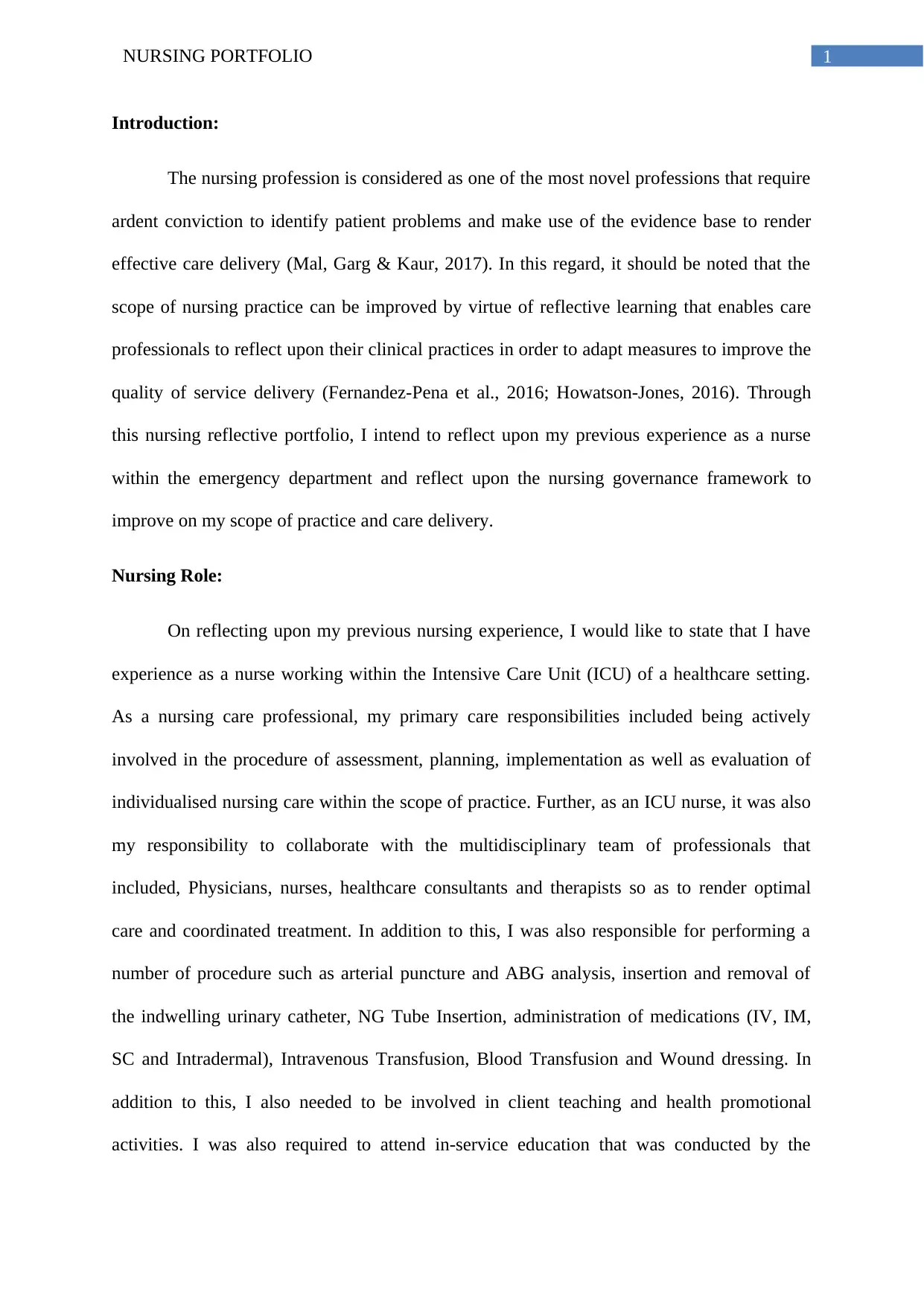
1NURSING PORTFOLIO
Introduction:
The nursing profession is considered as one of the most novel professions that require
ardent conviction to identify patient problems and make use of the evidence base to render
effective care delivery (Mal, Garg & Kaur, 2017). In this regard, it should be noted that the
scope of nursing practice can be improved by virtue of reflective learning that enables care
professionals to reflect upon their clinical practices in order to adapt measures to improve the
quality of service delivery (Fernandez-Pena et al., 2016; Howatson-Jones, 2016). Through
this nursing reflective portfolio, I intend to reflect upon my previous experience as a nurse
within the emergency department and reflect upon the nursing governance framework to
improve on my scope of practice and care delivery.
Nursing Role:
On reflecting upon my previous nursing experience, I would like to state that I have
experience as a nurse working within the Intensive Care Unit (ICU) of a healthcare setting.
As a nursing care professional, my primary care responsibilities included being actively
involved in the procedure of assessment, planning, implementation as well as evaluation of
individualised nursing care within the scope of practice. Further, as an ICU nurse, it was also
my responsibility to collaborate with the multidisciplinary team of professionals that
included, Physicians, nurses, healthcare consultants and therapists so as to render optimal
care and coordinated treatment. In addition to this, I was also responsible for performing a
number of procedure such as arterial puncture and ABG analysis, insertion and removal of
the indwelling urinary catheter, NG Tube Insertion, administration of medications (IV, IM,
SC and Intradermal), Intravenous Transfusion, Blood Transfusion and Wound dressing. In
addition to this, I also needed to be involved in client teaching and health promotional
activities. I was also required to attend in-service education that was conducted by the
Introduction:
The nursing profession is considered as one of the most novel professions that require
ardent conviction to identify patient problems and make use of the evidence base to render
effective care delivery (Mal, Garg & Kaur, 2017). In this regard, it should be noted that the
scope of nursing practice can be improved by virtue of reflective learning that enables care
professionals to reflect upon their clinical practices in order to adapt measures to improve the
quality of service delivery (Fernandez-Pena et al., 2016; Howatson-Jones, 2016). Through
this nursing reflective portfolio, I intend to reflect upon my previous experience as a nurse
within the emergency department and reflect upon the nursing governance framework to
improve on my scope of practice and care delivery.
Nursing Role:
On reflecting upon my previous nursing experience, I would like to state that I have
experience as a nurse working within the Intensive Care Unit (ICU) of a healthcare setting.
As a nursing care professional, my primary care responsibilities included being actively
involved in the procedure of assessment, planning, implementation as well as evaluation of
individualised nursing care within the scope of practice. Further, as an ICU nurse, it was also
my responsibility to collaborate with the multidisciplinary team of professionals that
included, Physicians, nurses, healthcare consultants and therapists so as to render optimal
care and coordinated treatment. In addition to this, I was also responsible for performing a
number of procedure such as arterial puncture and ABG analysis, insertion and removal of
the indwelling urinary catheter, NG Tube Insertion, administration of medications (IV, IM,
SC and Intradermal), Intravenous Transfusion, Blood Transfusion and Wound dressing. In
addition to this, I also needed to be involved in client teaching and health promotional
activities. I was also required to attend in-service education that was conducted by the
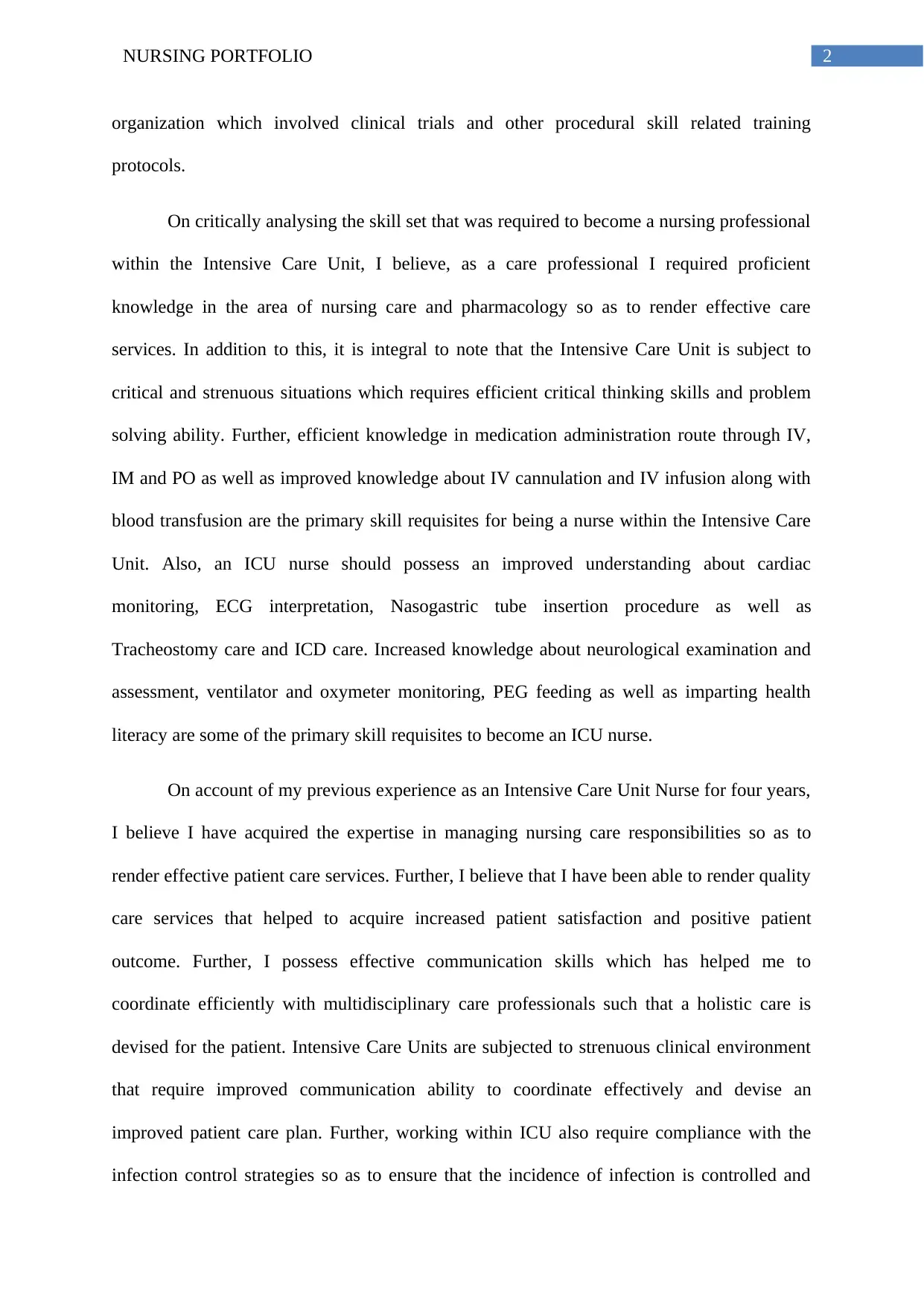
2NURSING PORTFOLIO
organization which involved clinical trials and other procedural skill related training
protocols.
On critically analysing the skill set that was required to become a nursing professional
within the Intensive Care Unit, I believe, as a care professional I required proficient
knowledge in the area of nursing care and pharmacology so as to render effective care
services. In addition to this, it is integral to note that the Intensive Care Unit is subject to
critical and strenuous situations which requires efficient critical thinking skills and problem
solving ability. Further, efficient knowledge in medication administration route through IV,
IM and PO as well as improved knowledge about IV cannulation and IV infusion along with
blood transfusion are the primary skill requisites for being a nurse within the Intensive Care
Unit. Also, an ICU nurse should possess an improved understanding about cardiac
monitoring, ECG interpretation, Nasogastric tube insertion procedure as well as
Tracheostomy care and ICD care. Increased knowledge about neurological examination and
assessment, ventilator and oxymeter monitoring, PEG feeding as well as imparting health
literacy are some of the primary skill requisites to become an ICU nurse.
On account of my previous experience as an Intensive Care Unit Nurse for four years,
I believe I have acquired the expertise in managing nursing care responsibilities so as to
render effective patient care services. Further, I believe that I have been able to render quality
care services that helped to acquire increased patient satisfaction and positive patient
outcome. Further, I possess effective communication skills which has helped me to
coordinate efficiently with multidisciplinary care professionals such that a holistic care is
devised for the patient. Intensive Care Units are subjected to strenuous clinical environment
that require improved communication ability to coordinate effectively and devise an
improved patient care plan. Further, working within ICU also require compliance with the
infection control strategies so as to ensure that the incidence of infection is controlled and
organization which involved clinical trials and other procedural skill related training
protocols.
On critically analysing the skill set that was required to become a nursing professional
within the Intensive Care Unit, I believe, as a care professional I required proficient
knowledge in the area of nursing care and pharmacology so as to render effective care
services. In addition to this, it is integral to note that the Intensive Care Unit is subject to
critical and strenuous situations which requires efficient critical thinking skills and problem
solving ability. Further, efficient knowledge in medication administration route through IV,
IM and PO as well as improved knowledge about IV cannulation and IV infusion along with
blood transfusion are the primary skill requisites for being a nurse within the Intensive Care
Unit. Also, an ICU nurse should possess an improved understanding about cardiac
monitoring, ECG interpretation, Nasogastric tube insertion procedure as well as
Tracheostomy care and ICD care. Increased knowledge about neurological examination and
assessment, ventilator and oxymeter monitoring, PEG feeding as well as imparting health
literacy are some of the primary skill requisites to become an ICU nurse.
On account of my previous experience as an Intensive Care Unit Nurse for four years,
I believe I have acquired the expertise in managing nursing care responsibilities so as to
render effective patient care services. Further, I believe that I have been able to render quality
care services that helped to acquire increased patient satisfaction and positive patient
outcome. Further, I possess effective communication skills which has helped me to
coordinate efficiently with multidisciplinary care professionals such that a holistic care is
devised for the patient. Intensive Care Units are subjected to strenuous clinical environment
that require improved communication ability to coordinate effectively and devise an
improved patient care plan. Further, working within ICU also require compliance with the
infection control strategies so as to ensure that the incidence of infection is controlled and

3NURSING PORTFOLIO
managed effectively so as to promote positive care outcome. Further, as an efficient nurse, I
have demonstrated competence with the NMBA code of conduct and professional standards
of Nursing Practice so as to ensure that the quality of care is not compromised and that the
care provided is aligned to the recommended NSQHS standards
(Nursingmidwiferyboard.gov.au, 2019; Safetyandquality.gov.au, 2019). Therefore, my
existing skill set and relevant experience in the field attributes for the reason why I would like
to take up the role of an ICU nursing care professional. Also, the strenuous clinical
environment of the Intensive Care Unit require nursing care professionals to manage care
responsibilities with patience and conviction (Shoorideh et al., 2015). Research reports
suggest that the prevalence of burnout and attrition is higher among nurses working within
the ICU on account of the increased stress prevailing within the clinical environment
(Chuang et al., 2016). Further, it is also difficult to manage personal and professional life,
however, I could efficiently manage the work stress and maintain an optimal balance between
the personal and professional life.
The above mentioned factors attribute to the reason, why I would prefer to take up the
role of ICU nurse again and would like to justify the care role and ensure that the quality of
patient care is not compromised. However, I feel that I would need to attend a refreshment
course on the key job responsibility areas that include, conducting assessments and
performing procedures such as administration of medications via IV, IM, SC and intradermal
route. Further, I would also need to thoroughly revise strategies on patient education and
preparation of clear and concise nursing progress notes so as to ensure that there is no scope
of miscommunication as it might compromise patient safety. I believe I would also need to
attend workshops on cultural safety and cultural competence so that I am able to impart
culturally safe care services to the patient and ensure that the care expectations of the patient
have thoroughly been met.
managed effectively so as to promote positive care outcome. Further, as an efficient nurse, I
have demonstrated competence with the NMBA code of conduct and professional standards
of Nursing Practice so as to ensure that the quality of care is not compromised and that the
care provided is aligned to the recommended NSQHS standards
(Nursingmidwiferyboard.gov.au, 2019; Safetyandquality.gov.au, 2019). Therefore, my
existing skill set and relevant experience in the field attributes for the reason why I would like
to take up the role of an ICU nursing care professional. Also, the strenuous clinical
environment of the Intensive Care Unit require nursing care professionals to manage care
responsibilities with patience and conviction (Shoorideh et al., 2015). Research reports
suggest that the prevalence of burnout and attrition is higher among nurses working within
the ICU on account of the increased stress prevailing within the clinical environment
(Chuang et al., 2016). Further, it is also difficult to manage personal and professional life,
however, I could efficiently manage the work stress and maintain an optimal balance between
the personal and professional life.
The above mentioned factors attribute to the reason, why I would prefer to take up the
role of ICU nurse again and would like to justify the care role and ensure that the quality of
patient care is not compromised. However, I feel that I would need to attend a refreshment
course on the key job responsibility areas that include, conducting assessments and
performing procedures such as administration of medications via IV, IM, SC and intradermal
route. Further, I would also need to thoroughly revise strategies on patient education and
preparation of clear and concise nursing progress notes so as to ensure that there is no scope
of miscommunication as it might compromise patient safety. I believe I would also need to
attend workshops on cultural safety and cultural competence so that I am able to impart
culturally safe care services to the patient and ensure that the care expectations of the patient
have thoroughly been met.
Secure Best Marks with AI Grader
Need help grading? Try our AI Grader for instant feedback on your assignments.

4NURSING PORTFOLIO
Governance:
The 15 National Boards are accredited by the Australian Health Practitioner
Regulation Agency and it requires care professionals, including all nursing care professionals
to comply with the set of guidelines so as to impart holistic, patient-centred and effective care
delivery (Agency, A., 2019). Prior to browsing through the 15 National Boards, I feel that the
guidelines have been established in order to impart safe and quality care services across the
territory of Australia. Further, I believe that the set guidelines are regulated by the National
legislation and policies that are entitled to make decisions with regard to the registered
applicants who are to practice the concerned health professions. I believe that the underlying
significance of the National Boards is to protect the community by ensuring that healthcare
professionals or practitioners that are appropriately trained are only registered such that the
criterion of patient safety is not compromised.
The holistic responsibilities of the National Boards include creation of standards for
the healthcare professionals to appropriately meet the care standards that are integral to
practice care services (Agency, A., 2019). In addition to this, establishment of policies and
undertaking appropriate decisions as well as investigating complaints and concerns that are
raised in relation to registered health practitioners can help to ensure that appropriate actions
are taken against care professionals that render poor quality of care and that patient healthcare
needs are prioritised (Agency, A., 2019). In addition to this, I further believe that the National
Boards would specifically cover the areas that encompass of the care procedure that should
be undertaken so as to render culturally safe care interventions and ensure that a culturally
safe therapeutic relationship is maintained with the patients (Agency, A., 2019). Also, I
believe that the guidelines would assist care professionals with the mandatory requisites that
Governance:
The 15 National Boards are accredited by the Australian Health Practitioner
Regulation Agency and it requires care professionals, including all nursing care professionals
to comply with the set of guidelines so as to impart holistic, patient-centred and effective care
delivery (Agency, A., 2019). Prior to browsing through the 15 National Boards, I feel that the
guidelines have been established in order to impart safe and quality care services across the
territory of Australia. Further, I believe that the set guidelines are regulated by the National
legislation and policies that are entitled to make decisions with regard to the registered
applicants who are to practice the concerned health professions. I believe that the underlying
significance of the National Boards is to protect the community by ensuring that healthcare
professionals or practitioners that are appropriately trained are only registered such that the
criterion of patient safety is not compromised.
The holistic responsibilities of the National Boards include creation of standards for
the healthcare professionals to appropriately meet the care standards that are integral to
practice care services (Agency, A., 2019). In addition to this, establishment of policies and
undertaking appropriate decisions as well as investigating complaints and concerns that are
raised in relation to registered health practitioners can help to ensure that appropriate actions
are taken against care professionals that render poor quality of care and that patient healthcare
needs are prioritised (Agency, A., 2019). In addition to this, I further believe that the National
Boards would specifically cover the areas that encompass of the care procedure that should
be undertaken so as to render culturally safe care interventions and ensure that a culturally
safe therapeutic relationship is maintained with the patients (Agency, A., 2019). Also, I
believe that the guidelines would assist care professionals with the mandatory requisites that
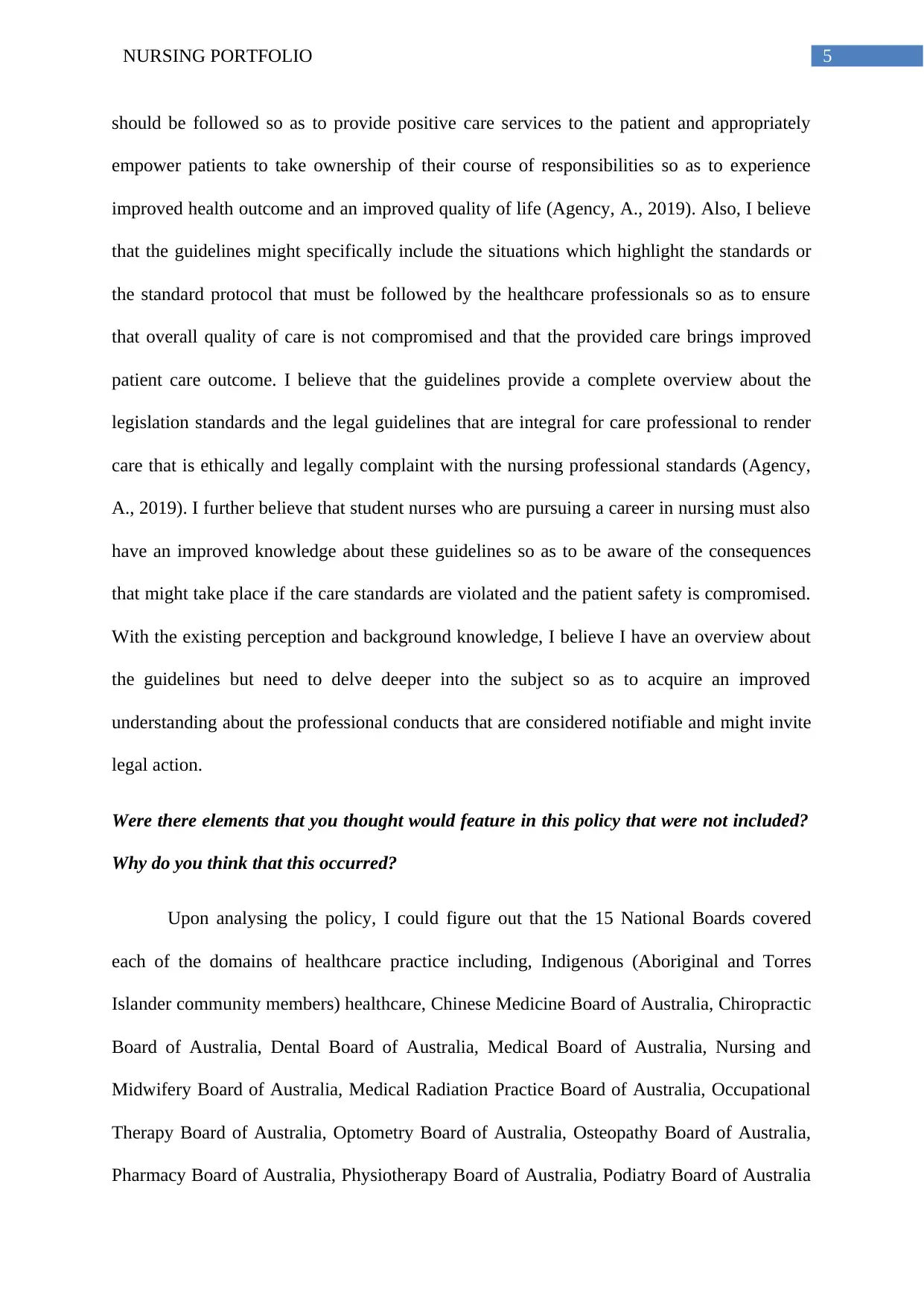
5NURSING PORTFOLIO
should be followed so as to provide positive care services to the patient and appropriately
empower patients to take ownership of their course of responsibilities so as to experience
improved health outcome and an improved quality of life (Agency, A., 2019). Also, I believe
that the guidelines might specifically include the situations which highlight the standards or
the standard protocol that must be followed by the healthcare professionals so as to ensure
that overall quality of care is not compromised and that the provided care brings improved
patient care outcome. I believe that the guidelines provide a complete overview about the
legislation standards and the legal guidelines that are integral for care professional to render
care that is ethically and legally complaint with the nursing professional standards (Agency,
A., 2019). I further believe that student nurses who are pursuing a career in nursing must also
have an improved knowledge about these guidelines so as to be aware of the consequences
that might take place if the care standards are violated and the patient safety is compromised.
With the existing perception and background knowledge, I believe I have an overview about
the guidelines but need to delve deeper into the subject so as to acquire an improved
understanding about the professional conducts that are considered notifiable and might invite
legal action.
Were there elements that you thought would feature in this policy that were not included?
Why do you think that this occurred?
Upon analysing the policy, I could figure out that the 15 National Boards covered
each of the domains of healthcare practice including, Indigenous (Aboriginal and Torres
Islander community members) healthcare, Chinese Medicine Board of Australia, Chiropractic
Board of Australia, Dental Board of Australia, Medical Board of Australia, Nursing and
Midwifery Board of Australia, Medical Radiation Practice Board of Australia, Occupational
Therapy Board of Australia, Optometry Board of Australia, Osteopathy Board of Australia,
Pharmacy Board of Australia, Physiotherapy Board of Australia, Podiatry Board of Australia
should be followed so as to provide positive care services to the patient and appropriately
empower patients to take ownership of their course of responsibilities so as to experience
improved health outcome and an improved quality of life (Agency, A., 2019). Also, I believe
that the guidelines might specifically include the situations which highlight the standards or
the standard protocol that must be followed by the healthcare professionals so as to ensure
that overall quality of care is not compromised and that the provided care brings improved
patient care outcome. I believe that the guidelines provide a complete overview about the
legislation standards and the legal guidelines that are integral for care professional to render
care that is ethically and legally complaint with the nursing professional standards (Agency,
A., 2019). I further believe that student nurses who are pursuing a career in nursing must also
have an improved knowledge about these guidelines so as to be aware of the consequences
that might take place if the care standards are violated and the patient safety is compromised.
With the existing perception and background knowledge, I believe I have an overview about
the guidelines but need to delve deeper into the subject so as to acquire an improved
understanding about the professional conducts that are considered notifiable and might invite
legal action.
Were there elements that you thought would feature in this policy that were not included?
Why do you think that this occurred?
Upon analysing the policy, I could figure out that the 15 National Boards covered
each of the domains of healthcare practice including, Indigenous (Aboriginal and Torres
Islander community members) healthcare, Chinese Medicine Board of Australia, Chiropractic
Board of Australia, Dental Board of Australia, Medical Board of Australia, Nursing and
Midwifery Board of Australia, Medical Radiation Practice Board of Australia, Occupational
Therapy Board of Australia, Optometry Board of Australia, Osteopathy Board of Australia,
Pharmacy Board of Australia, Physiotherapy Board of Australia, Podiatry Board of Australia
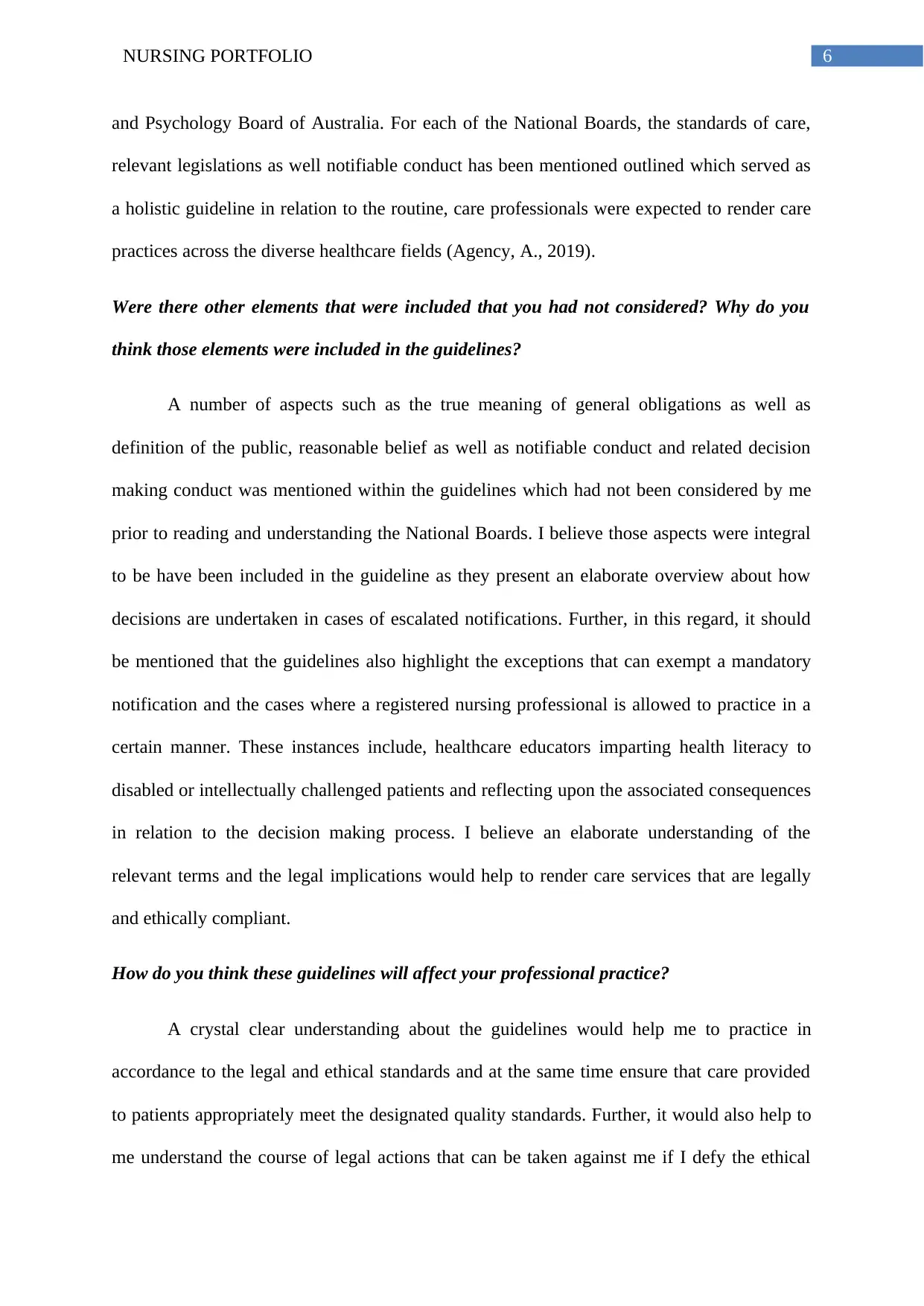
6NURSING PORTFOLIO
and Psychology Board of Australia. For each of the National Boards, the standards of care,
relevant legislations as well notifiable conduct has been mentioned outlined which served as
a holistic guideline in relation to the routine, care professionals were expected to render care
practices across the diverse healthcare fields (Agency, A., 2019).
Were there other elements that were included that you had not considered? Why do you
think those elements were included in the guidelines?
A number of aspects such as the true meaning of general obligations as well as
definition of the public, reasonable belief as well as notifiable conduct and related decision
making conduct was mentioned within the guidelines which had not been considered by me
prior to reading and understanding the National Boards. I believe those aspects were integral
to be have been included in the guideline as they present an elaborate overview about how
decisions are undertaken in cases of escalated notifications. Further, in this regard, it should
be mentioned that the guidelines also highlight the exceptions that can exempt a mandatory
notification and the cases where a registered nursing professional is allowed to practice in a
certain manner. These instances include, healthcare educators imparting health literacy to
disabled or intellectually challenged patients and reflecting upon the associated consequences
in relation to the decision making process. I believe an elaborate understanding of the
relevant terms and the legal implications would help to render care services that are legally
and ethically compliant.
How do you think these guidelines will affect your professional practice?
A crystal clear understanding about the guidelines would help me to practice in
accordance to the legal and ethical standards and at the same time ensure that care provided
to patients appropriately meet the designated quality standards. Further, it would also help to
me understand the course of legal actions that can be taken against me if I defy the ethical
and Psychology Board of Australia. For each of the National Boards, the standards of care,
relevant legislations as well notifiable conduct has been mentioned outlined which served as
a holistic guideline in relation to the routine, care professionals were expected to render care
practices across the diverse healthcare fields (Agency, A., 2019).
Were there other elements that were included that you had not considered? Why do you
think those elements were included in the guidelines?
A number of aspects such as the true meaning of general obligations as well as
definition of the public, reasonable belief as well as notifiable conduct and related decision
making conduct was mentioned within the guidelines which had not been considered by me
prior to reading and understanding the National Boards. I believe those aspects were integral
to be have been included in the guideline as they present an elaborate overview about how
decisions are undertaken in cases of escalated notifications. Further, in this regard, it should
be mentioned that the guidelines also highlight the exceptions that can exempt a mandatory
notification and the cases where a registered nursing professional is allowed to practice in a
certain manner. These instances include, healthcare educators imparting health literacy to
disabled or intellectually challenged patients and reflecting upon the associated consequences
in relation to the decision making process. I believe an elaborate understanding of the
relevant terms and the legal implications would help to render care services that are legally
and ethically compliant.
How do you think these guidelines will affect your professional practice?
A crystal clear understanding about the guidelines would help me to practice in
accordance to the legal and ethical standards and at the same time ensure that care provided
to patients appropriately meet the designated quality standards. Further, it would also help to
me understand the course of legal actions that can be taken against me if I defy the ethical
Paraphrase This Document
Need a fresh take? Get an instant paraphrase of this document with our AI Paraphraser

7NURSING PORTFOLIO
code of conduct and also help me acquire awareness about the reporting protocol that should
be followed while raising a notification. This would specifically help me be aware of my
professional responsibilities and legal obligation as a nursing professional and render optimal
care that meets the holistic patient care needs.
Conclusion:
Therefore, in conclusion, it can be mentioned that upon critically reflecting on my
previous clinical experience, I believe that I would like to witness myself in the role of an
ICU nurse. The rationale for the same being my previous clinical experience and the optimal
skillset that would help me to justify my role as an ICU nurse. Further, I believe a
refreshment training on the medication administration and criticalities can help me brush up
mu concepts as the rate of medication error is the highest within the ICU setting. Also, an
advanced knowledge about the 15 National Board areas would help me improve my scope of
practice and render care that is suitable to acquire positive patient outcome.
code of conduct and also help me acquire awareness about the reporting protocol that should
be followed while raising a notification. This would specifically help me be aware of my
professional responsibilities and legal obligation as a nursing professional and render optimal
care that meets the holistic patient care needs.
Conclusion:
Therefore, in conclusion, it can be mentioned that upon critically reflecting on my
previous clinical experience, I believe that I would like to witness myself in the role of an
ICU nurse. The rationale for the same being my previous clinical experience and the optimal
skillset that would help me to justify my role as an ICU nurse. Further, I believe a
refreshment training on the medication administration and criticalities can help me brush up
mu concepts as the rate of medication error is the highest within the ICU setting. Also, an
advanced knowledge about the 15 National Board areas would help me improve my scope of
practice and render care that is suitable to acquire positive patient outcome.
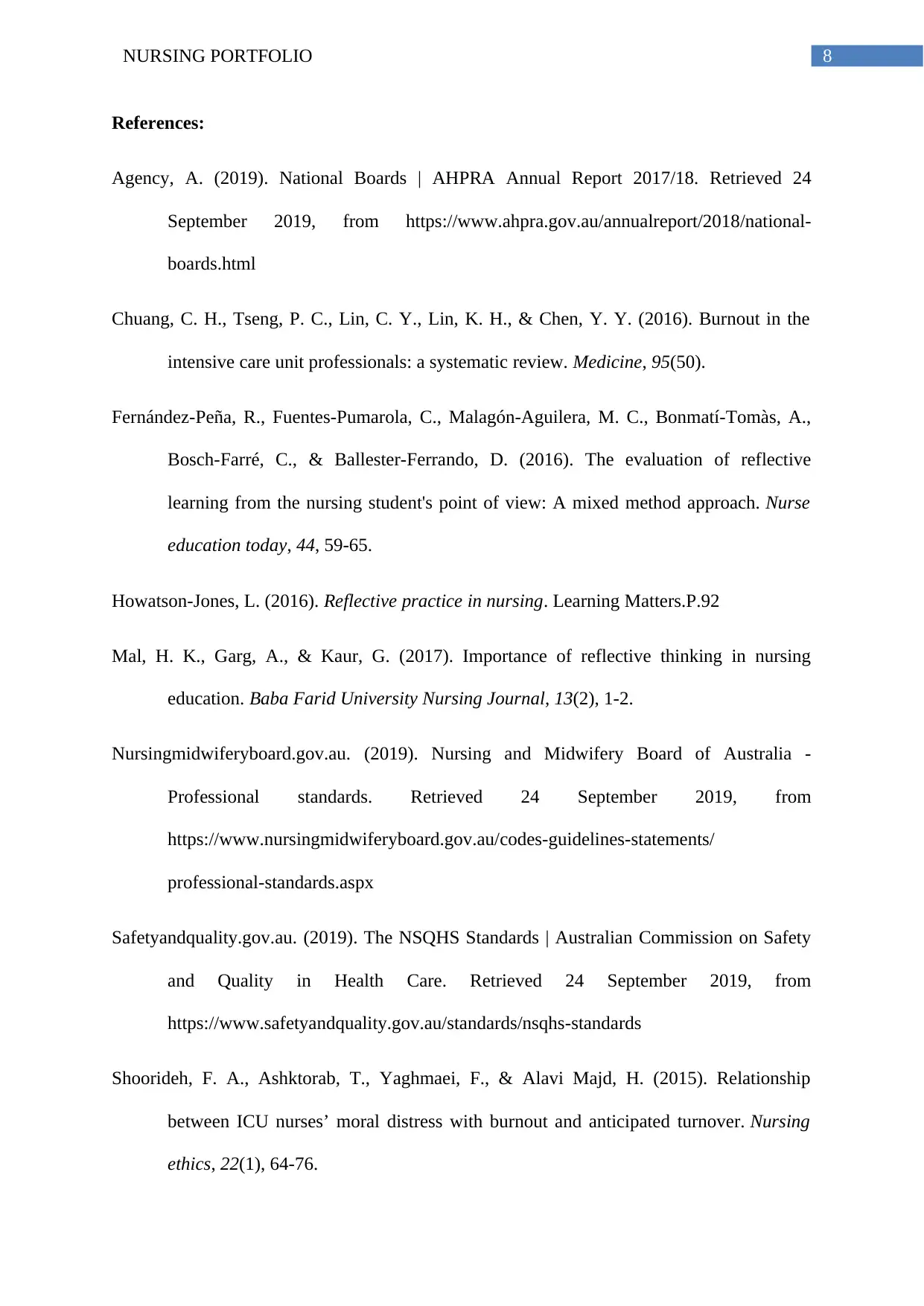
8NURSING PORTFOLIO
References:
Agency, A. (2019). National Boards | AHPRA Annual Report 2017/18. Retrieved 24
September 2019, from https://www.ahpra.gov.au/annualreport/2018/national-
boards.html
Chuang, C. H., Tseng, P. C., Lin, C. Y., Lin, K. H., & Chen, Y. Y. (2016). Burnout in the
intensive care unit professionals: a systematic review. Medicine, 95(50).
Fernández-Peña, R., Fuentes-Pumarola, C., Malagón-Aguilera, M. C., Bonmatí-Tomàs, A.,
Bosch-Farré, C., & Ballester-Ferrando, D. (2016). The evaluation of reflective
learning from the nursing student's point of view: A mixed method approach. Nurse
education today, 44, 59-65.
Howatson-Jones, L. (2016). Reflective practice in nursing. Learning Matters.P.92
Mal, H. K., Garg, A., & Kaur, G. (2017). Importance of reflective thinking in nursing
education. Baba Farid University Nursing Journal, 13(2), 1-2.
Nursingmidwiferyboard.gov.au. (2019). Nursing and Midwifery Board of Australia -
Professional standards. Retrieved 24 September 2019, from
https://www.nursingmidwiferyboard.gov.au/codes-guidelines-statements/
professional-standards.aspx
Safetyandquality.gov.au. (2019). The NSQHS Standards | Australian Commission on Safety
and Quality in Health Care. Retrieved 24 September 2019, from
https://www.safetyandquality.gov.au/standards/nsqhs-standards
Shoorideh, F. A., Ashktorab, T., Yaghmaei, F., & Alavi Majd, H. (2015). Relationship
between ICU nurses’ moral distress with burnout and anticipated turnover. Nursing
ethics, 22(1), 64-76.
References:
Agency, A. (2019). National Boards | AHPRA Annual Report 2017/18. Retrieved 24
September 2019, from https://www.ahpra.gov.au/annualreport/2018/national-
boards.html
Chuang, C. H., Tseng, P. C., Lin, C. Y., Lin, K. H., & Chen, Y. Y. (2016). Burnout in the
intensive care unit professionals: a systematic review. Medicine, 95(50).
Fernández-Peña, R., Fuentes-Pumarola, C., Malagón-Aguilera, M. C., Bonmatí-Tomàs, A.,
Bosch-Farré, C., & Ballester-Ferrando, D. (2016). The evaluation of reflective
learning from the nursing student's point of view: A mixed method approach. Nurse
education today, 44, 59-65.
Howatson-Jones, L. (2016). Reflective practice in nursing. Learning Matters.P.92
Mal, H. K., Garg, A., & Kaur, G. (2017). Importance of reflective thinking in nursing
education. Baba Farid University Nursing Journal, 13(2), 1-2.
Nursingmidwiferyboard.gov.au. (2019). Nursing and Midwifery Board of Australia -
Professional standards. Retrieved 24 September 2019, from
https://www.nursingmidwiferyboard.gov.au/codes-guidelines-statements/
professional-standards.aspx
Safetyandquality.gov.au. (2019). The NSQHS Standards | Australian Commission on Safety
and Quality in Health Care. Retrieved 24 September 2019, from
https://www.safetyandquality.gov.au/standards/nsqhs-standards
Shoorideh, F. A., Ashktorab, T., Yaghmaei, F., & Alavi Majd, H. (2015). Relationship
between ICU nurses’ moral distress with burnout and anticipated turnover. Nursing
ethics, 22(1), 64-76.
1 out of 9
Related Documents
Your All-in-One AI-Powered Toolkit for Academic Success.
+13062052269
info@desklib.com
Available 24*7 on WhatsApp / Email
![[object Object]](/_next/static/media/star-bottom.7253800d.svg)
Unlock your academic potential
© 2024 | Zucol Services PVT LTD | All rights reserved.





